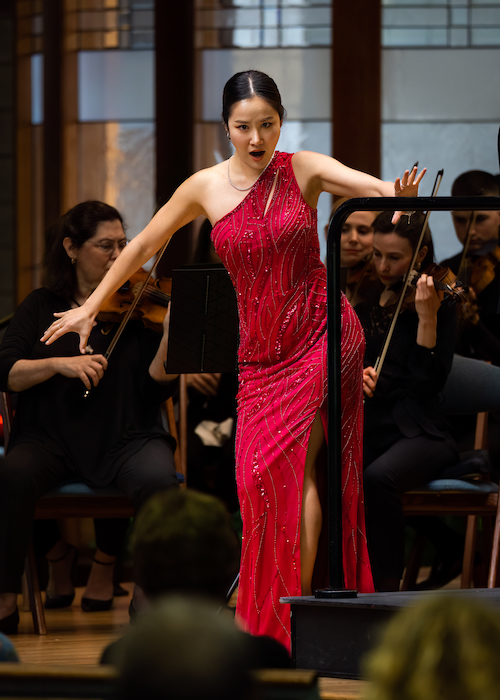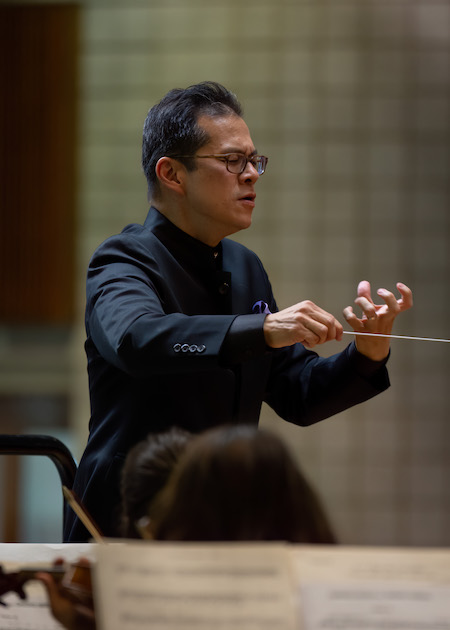Soprano Park delivers the highlights as Chan closes Apollo Orchestra season

Hera Hyesang Park sang opera arias with David Chan conducting the Apollo Orchestra on Sunday. Photo: Eddie Sanders
The Apollo Orchestra has been without a music director since last October, when it was announced that Stephen Czarkowski no longer held that position. Three guest conductors have taken the podium this season, after the first concert with Czarkowski. Joining David Neely and Cho-Liang Lin in the rotation, David Chan conducted the ensemble in its latest free concert, presented at Burtonsville’s Church of the Resurrection Sunday afternoon.
(According to marketing director Jordan Avellino, the Apollo Orchestra has no official statement at the moment about its music director position. They will be releasing more information about next season sometime this summer.)
Chan has served as one of the concertmasters with the Metropolitan Opera Orchestra for 23 years. Chan took the stage with Apollo as violin soloist in March, for a concert conducted by Neely, but this time he held the baton, the latest in his recent forays into conducting. Not surprisingly, he sounded most at home in the first half of this program, focused on operatic selections.
The small string section of twenty-two players responded to Chan’s leadership with admirable unity of sound in the Overture from Mozart’s The Magic Flute. The work’s signature chattering notes lined up precisely, after some minor issues establishing the tempo. Flute and oboe made excellent solo contributions, and the brass intervened on the Masonic knock motif, those imposing triple chords heard a few times, with powerful and balanced sound.
Arias sung by Hera Hyesang Park proved the indisputable highlight of the afternoon. The South Korean soprano displayed a velvety legato tone in “Deh vieni, non tardar,” Susanna’s aria from the final act of Mozart’s The Marriage of Figaro. Her warm, lyric voice featured polished line and dynamic control, with each note immaculately placed and in tune. Park used her charming stage presence to comic effect in “Non si dà follia maggiore” from Rossini’s Il turco in Italia, showing off her agile and precise runs, as well as limpid top notes.
Chan and the orchestra gave Park a short respite by playing the gorgeous Intermezzo from Mascagni’s Cavalleria rusticana. The valiant string ensemble sounded lush and shimmering, although the two violin sections, seated by Chan on opposite sides of the stage, had trouble at times tuning their lines to one another. Once again the flute playing by principal Stacy Ascione stood out for praise.

David Chan conducted the Apollo Orchestra in Burtonsville. Photo: Eddie Sanders.
Harpist Cara Fleck Plewinski shared the spotlight in “Juste ciel” from Rossini’s Le siège de Corinthe, which Park sang beautifully in the Italian translation. The soprano’s stage mannerisms could be affected, but the singing brought out the tragic quality of the music, not least a feathery portamento technique like a sigh connecting some notes.
More virtuosic escapades were in store in a blockbuster rendition of “Una voce poco fa” from Rossini’s Barber of Seville. Park’s broad vocal range, from some gentle low notes up to soaring heights, came across even in meticulously clear runs. The encore, a moving rendition of “O mio babbino caro” from Puccini’s Gianni Schicchi, offered another facet of Park’s estimable voice, a whisper-sensitive lyric floating tone.
Chan had trouble at times with the clarity of his beat, which tripped up the opening bass introduction to Schubert’s Eighth Symphony (“Unfinished”). Once the tempo had clicked, things were more secure, as when this theme returned later in the first movement. Principal clarinetist Shawn Buck had fine solo work, as did the other woodwind players, and the quartet of cellists lilted with a mellow sound on this movement’s famous second theme. The tempo of the second movement charmed, too, not rushed so that the pleading melody played admirably by the clarinet and oboe could sing.
It is possible that Schubert intended to leave the Eighth Symphony in its two-movement form, a point argued convincingly by the conductor René Jacobs in his recent recording. Chan and the orchestra tried instead to finish the “Unfinished,” by appending Mendelssohn’s concert overture A Midsummer Night’s Dream. Although the key signatures lined up conveniently, there was little else that suggested kinship between the works.
Chan’s splitting of the two violin sections made some fun antiphonal interplay more obvious, visually and audibly. While the strings struggled at times, the braying motif of the Rude Mechanicals’s music was hilarious. The brass and timpani provided booming support throughout, and each time the mysterious wind chords of the overture’s opening measures appeared, they were glowing and perfectly tuned.
The Apollo Orchestra opens its 2023-2024 season with music of Wagner, Barber, and Brahms, featuring conductor David Neely and cellist Hai-Ye Ni, 4 p.m. September 24. apolloorchestra.com
